I could not be prouder today. Quill’s first Single Broker Listing is live and looks great! On the Quill Blog, on Zillow, on Redfin – heck, it looks great EVERYWHERE!! By my estimation, this is what the future of real estate will look like: One broker marketing a property directly to buyers via multiple channels, without offering to pay the buyer’s agent’s commission (so no MLS number). Exciting times here at Quill!!
Category Archives: Redfin
“Zillow Talk: The New Rules of Real Estate”: Zillow Tries Too Hard, Tips Its Hand; the Future of Real Estate Isn’t Here Yet (But It’s Close)
Zillow Talk: The New Rules of Real Estate, by Spencer Rascoff and Stan Humphries
Reviewed by Craig Blackmon
This book by Zillow’s CEO and Chief Economist, respectively, is a wonderful advertisement for Zillow. It’s also a good book. It’s easy to read – really easy, clearly written to appeal to the broadest spectrum of readers – and very informative. It does a good job of illustrating the power of data and how it can be harnessed to make the most informed investment decision possible when buying a house.
But the book aims higher. It concludes with some stirring language about the power of data (don’t worry, this doesn’t require a Spoiler Alert): “Numbers don’t lie. And they won’t lead you astray. Indeed, they’ll help you find your way home.” (The same expression dominates the Zillow home page.)
Ah, home. The term is associated with so many wonderful things: family, laughter, love, shelter, protection, and on and on. “Home” is not just a place. It’s a very special place, a destination that is both more common and more unique than any other.
Is this book going to help you find your way to your home? Probably not. In fact, I hope not. Home requires more than a well-researched financial decision. Much more. Besides, any prediction of the future is just that, a prediction, and in the meantime life marches on. A good life needs a good home, regardless of the financial future.
With its focus on the trees and not the forest, the reader is left with a sense that it is much ado about nothing. The book relentlessly promotes the web site, implicitly and explicitly, from start to finish. You’re left wondering: Is that it? Has Zillow really changed real estate? The web site provides useful insight, sure. But it hardly upends real estate, an industry that continues to operate on a 19th Century model. Does Zillow show us the final, evolved real estate industry of the modern, technological, information age? I mean, nobody uses a travel agent or a stock broker anymore….
The answer is revealed by a closer examination of Zillow and the people behind it. I believe Zillow is an ongoing project that will change dramatically as real estate evolves. And it will be instrumental in that evolution. But Zillow itself cannot lead the change. And in the meantime, it uses a business model that keeps it in business, biding its time until the eventual evolution.
This book is a “must read” for investors and real estate brokers, but not homeowners
In other words, folks who make a business out of real estate will benefit from reading this book. It does an excellent job of demonstrating how data – available via zillow.com, a constant underlying refrain throughout the book – can be used to calculate a property’s current and future value. So if the primary and essentially sole reason for purchasing a house is to make money (or if you sell houses yourself), this is a great book. It’s loaded with a lot of great insight.
For example, did you know that proximity to Starbucks is a good indicator of better appreciation? (Chapter 4) Or that you should list your home between March Madness and the Masters if you want the best chance at the best price? (Chapter 12) Fascinating stuff and worth considering when you are investing hundreds of thousands of dollars. A slightly better percentage return, thanks to in-depth analysis of the available data, can lead to quite a bit more money.
But if you’re looking to buy a home, don’t bother with this book. It’s myopic focus on dollar values simply doesn’t foster a good decision when looking for a home. Should you take into account financial considerations? Of course. But the primary focus should be on finding the right home for you and your family. So, while good schools may be an indicator of future value (Chapter 6), that shouldn’t be the focus. Rather, look for good schools so that your kids get a good education. This is a home. Not just an investment.
Zillow Is Setting the Stage for the Future of Real Estate
In its current iteration, Zillow doesn’t really do much in terms of bringing the real estate industry into the 21st Century. As the book makes clear, Zillow simply wants to attract as many visitors to its web site as possible. Why? Because Zillow makes money as a lead generator for today’s real estate brokers.
In other words, Zillow currently complements and feeds off of traditional real estate brokers. The more people who use the Zillow site, the more leads that Zillow generates, and thus the more money it makes. Zillow is built on web traffic, nothing more. And it doesn’t do anything to disrupt a long-standing traditional industry, because that industry is it’s target market. Even though that same industry is ripe for disruption.
Which is weird. Because the guy who co-founded Zillow previously co-founded Expedia. The web site that put travel agents out of business. Rich Barton is a widely recognized and highly regarded “disrupter.” His motto is “power to the people.” He believes that the internet can empower consumers in new ways that lead to better and more efficient ways of doing things. According to Mr. Barton, his companies Zillow and Expedia have “created new opportunities for new professionals to make new businesses for themselves.”
Except that Zillow hasn’t. Not yet, anyway. It’s merely expanded existing opportunities (lead generation) for a long-standing professional industry that allows it to sustain it’s dominant market position. Nothing new there.
But what if Zillow is a work in progress? What if, in only the highest level strategic planning documents, there is a plan for Zillow 2.0? That would start to make some sense.
What the Future of Real Estate is Going to Look Like
Today, there are two ways to sell your home: FSBO, or using the traditional cooperative real estate broker system. Home sellers can market their properties via many different channels other than the local MLS. Including, of course, Zillow, which shows both “Make Me Move” and true “for sale by owner” listings. So an owner is empowered by the internet and can forego using the real estate broker system, which includes payment of a commission to a cooperating agent.
But what if the home seller wants the professional insight and counsel of a real estate broker? From advice on preparing the home to market, to staging, to keeping the seller informed and educated, a real estate broker provides substantial value. And the broker is a trained marketing professional who will efficiently and effectively utilize the full array of marketing channels available in the 21st Century: yard sign, flyer, and open houses and tours, of course; but also web sites and social media.
Today, that real estate broker can exist, thanks to Zillow. With its brand recognition and size, it is used by a large number of home buyers. A “listing” on Zillow can lead buyers to the home, without paying for other agents to bring them. So a home seller can sell for a fraction of the cost, as they will no longer need to pay the 3% buyer agent commission.
In other words, Zillow has positioned itself to be one of the successors to the multiple listing services maintained by cooperating real estate brokerages all over the country. And by positioning itself there, it provides the platform necessary for meaningful change in real estate. But until that change happens, Zillow will sustain itself (and its shareholders) by working within the existing system.
An Open Letter to Glenn Kelman, Redfin CEO, on the “Discount Real Estate Broker” Model
Post Updated 5/20/15:
P.S. Glenn, more than a year has gone by. I’ve busted my you-know-what trying to build a better Redfin-style mousetrap. And a couple of months ago, I said to myself: Wait a sec. I don’t think that sort of mousetrap is EVER going to work. I think technology and modern business practices have rendered that old type of mousetrap obsolete. The world is just waiting for somebody to invent something different entirely. Real estate isn’t immune to evolution. It just takes real change and a new way of doing things before it evolves.
So yesterday, I announced my imminent withdrawal from the NWMLS. A move made possible, in part Glenn, by Redfin’s devotion to solid data quality. Via FSBO platforms, I will be able to list homes for sale on Redfin – exactly where most buyers are looking in Seattle – without having to list on the NWMLS. And thus without having to pay a cooperating broker commission in the first place. But unlike Redfin and every other real estate firm – whether traditional or alternative – I won’t be on the NWMLS.
So this is where we part company – for now! 🙂 I suspect Redfin still has room to evolve…
-CB
The original letter to Glenn dated February 18, 2014:
Redfin – Scouting Reports – Nerd Values – Craig Newmark
So…you may be wondering what all the Hoo-Ha is about.
The posts and comments in the above links are embarrassing to the Real Estate Industry at best, and convey a HUGE misunderstanding between the “Agents and the Nerds”.
Remember Glenn’s “Memo from Nerd-Land to Realtors: Drop Dead” post? Well…let’s just say the Industry’s immediate response to Redfin’s Scouting Reports was that same message…in reverse…for now.
The issues are many and varied, as they always are.
How many transactions does an agent have under their belt was the primary focus of this Redfin attempt at “transparency”.
* * * * * * * * * * * * * *Why is TRUTH creating so much controversy? Simple. Who’s Truth???* * * * * * * * * * * * *

LET’S LOOK AT ONE OF THE KEY POINTS OF THE DISPUTE
USING THE CHART and SCREEN SHOT BELOW.
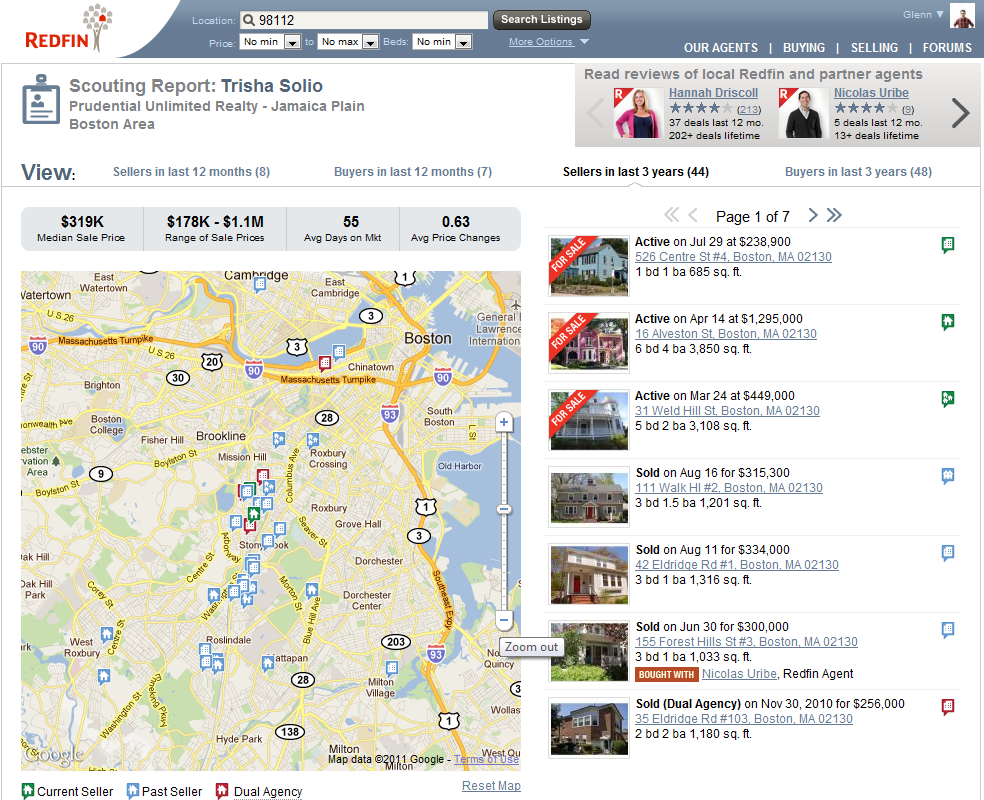
OK…Right off the bat…HOUSTON…WE HAVE A PROBLEM!!!
In this corner…we have Ms. Traditional Agent with 8 sellers and 7 buyers in a 12 month period.
In this corner…we have…drumroll please…Ms. Redfin Agent with 37 “deals” in a 12 month period…no destinction between listings sold or buyers helped and 212 “DEALS IN A LIFETIME!” with no “lifetime” stats for anyone else.
Since every ONE Redfin agent is FIVE licensed agents, per the Redfin site,
that 37 for “the Redfin Agent”
is really only 7.40 compared to Ms. Prudential’s 15,
isn’t it?
37 “deals” divided by 5 licensees = 7.40 each.
C’mon Matt…I love ya. But treated everyone “the same”? I know you truly believe that in your heart of hearts…but your model is just so different that it stacks the deck in your favor. I’m sure after reading this, you will understand what all the hoo-ha is about. That is my goal…to bring both sides a little closer together, so Scouting Reports may in fact BE a future reality.
It would be great! It could be great! But, you can’t expect mls sytems or other agents to “stack their deck” the same way that your model does, can you? I mean really.
If one Traditional Brokerage put ALL the company’s sales in the names of TEN of their 100 agents…wouldn’t you call them “Liar, Liar…pants on Fire?” …and yet, that is what you are doing. God Forbid a Traditional Company would do that…you’d tear them to shreds!
Below, See Why the Redfin Data is SO MISLEADING! in a comparison of this type.
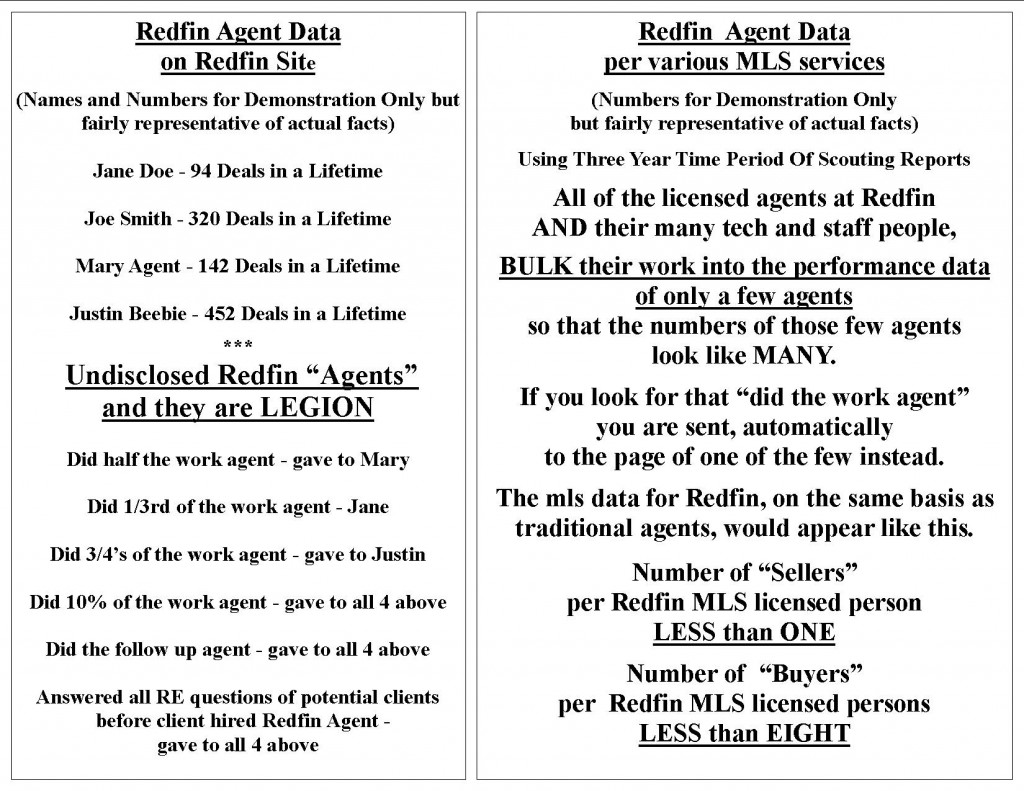
There are tons of comments all over the internet freaking out about all this, and rightly so, and from both sides of the equation.
To my good friend Jeff Turner who said to me that Homebuyers Didn’t ASK For THIS, I offer this quote,
“Steve Jobs Knew What We Wanted Before We Knew We Wanted It.”
THAT is what Redfin, and as Glenn Kelman put it “Nerd-Land”, is all about. The Traditional Industry makes what THEY want consumers to want…and then spoon feeds it to them with a little bit of sugar to make the medicine go down.
It is near impossible for Traditional Agents to understand Redfin, or Glenn Kelman, or Matt Goyer, because we are in the same industry, kind of. That makes every act of theirs “suspect” in the minds of their traditional brokerage “competition”. Or…perhaps…the darts are thrown merely to hold them at bay.
BUT what OUR INDUSTRY needs to “get” in order to understand Redfin and the Future of Real Estate, is the understanding of “Nerd Values”. I stole that term from Craig Newmark.
If you can understand Craig Newmark…even just a little bit, and I urge you to try, you will understand Redfin and what Redfin is about.
A few relevant quotes from Craig Newmark as seen in this video:
“Doing WELL by doing GOOD.”
“The SEA of Goodwill”
“…good intentions are REQUIRED…”
“LikeMinded.Org”
Nerd’s WILL: – “Annoy Them Into That Mode That Has Value.”
People Call Redfin “an outsider” BUT…remember this…Craig Newmark when creating Craigslist was ALSO “an outsider”.
Redfin is to Real Estate as Craigslist is to Classified Advertising.
The Nerds will be heard, and will infiltrate every aspect of our lives, until they beat down the selfish intentions and replace those with good intentions. That is the FUTURE. That IS Social Media. That IS blogging. That IS The Internet.
“People are normally trustworthy and generous, and the Internet brings the good out far more than the bad.” Craig Newmark
The Future of Real Estate will lie in these principals. The Nerds will “annoy (us) into that mode that has value”. In the meantime…the industry as a whole…well most of it…will keep responding with THIS.
New Rule on Home Blogging & Zillow
There’s a lot of talk going on about the new mls rules regarding blogging about homes for sale. The same new rule can prevent agents from posting their listings on Zillow, or any site that has Zillow or another “AVM” feature as a complement to the information available on the same site as the home listing. Basically sellers will now opt in or opt out of these categories separately, when they list their home for sale with an mls member.
Below are links to conversations already happening regarding the new rule that will shortly go into effect. No one has answered my one question yet in any of these conversations. Does the “new” rule pre-empt the old rule 190? In other words, if a seller clicks “yes” to allow his home to be blogged about, does that “yes” apply to ALL bloggers OR only the listing agent. If I see in the mls a “yes” as to blogging allowed by the seller…do I still need the listing agent’s permission per rule 190, in addition to the seller’s permission?
Seems to me the rule should have more options like “yes MY agent CAN, but no other agents cannot”.
None of these changes impact me or the way I currently blog, but given there is so much being said on the topic, a simple re-direct to these online discussions via the links below, should give you the complete picture. My guess is large brokerages will choose FOR their sellers by company policy, and the actual seller making the opt in and opt out decision will not really come to pass. So much ado about nothing.
- NWMLS looks to crack down on AVMs, real estate blogging as told by John Cook on Tech Flash with quotes from Redfin’s Glenn Kelman.
- Power to the Seller: The Unzillowing of Real Estate by Joseph Ferarra on Sellsius Real Estate Blog
- Revised rules may forbid real estate blogging by Marlow Harris on 360 degree digest
Is Your Open House In The NWMLS For ALL To See?
 The last few weeks have been extremely busy open house wise for us in Seattle – mostly in the $400,000 and under price range or close to it. Agent hits on the NWMLS for those listings has also soared and the web traffic in general has increased for this price point. The buyers are definitely out there poking around!
The last few weeks have been extremely busy open house wise for us in Seattle – mostly in the $400,000 and under price range or close to it. Agent hits on the NWMLS for those listings has also soared and the web traffic in general has increased for this price point. The buyers are definitely out there poking around!
Many of my recent open house visitors have been Redfin buyers. They seem to expect to be treated poorly by other agents at opens. Maybe this is just my own perception, but they are physically cringing upon entrance. I guess it could be my outfit or my hair, but more likely it must have to do with the typical reception a Redfin buyer might get. The point of an open house has always been for the hosting agent to meet, network, and possibly pick up new clients. Although it is also great exposure for the listed property, very rarely does the open house sell the home – at least it didn’t used to.
Enter Redfin.
Redfin arguably has one of the nicest real estate search websites and their open house feature is probably second to none. I can’t keep up with their changing business model and have no idea how effective or not they are for their clients, but do love their site and always welcome Redfin buyers to my open houses. Redfin buyers seem to almost always be actively looking for a home. They meticulously schedule and map out the open houses they plan to visit and they come with questions prepared. In short, they are serious.
One little problem:
Open houses that show up on the site are swept from the NWMLS when a listing agent enters the information in the “public open houses” field of their listing and not all listing agents do this. Some companies prefer to hold on to that information and only enter their open houses on their corporate site alone. Soon enough, though, most agents will hopefully catch up and realize that not entering their opens for all to see is a disservice to the seller. Just looking at Seattle stats alone in the NWMLS, Redfin has sold 62 residential properties and 9 condos since the beginning of the year. Redfin buyers are clearly putting a dent in the inventory.
Redfin aside, it is just smart business and good representation to enter your open house into the NWMLS so that you expose your seller’s property to as many potential buyers as possible.
OpenSearch is beyond cool – it’s the new cold
I was reading Redfin’s Developer Blog and the IE blog a few months ago and I got this desire to write my own OpenSearch provider. OpenSearch was originally created by A9.com (an Amazon.com company) and was primarily designed as a way for web developers to publish search results in a standard and accessible format. This turns out to be a good idea because different types of content require different types of search engines. The best search engine for a particular type of content is frequently the search engine written by the people that know the content the best. Google is great at searching unstructured content on the internet, but when it comes to structured search on a single web site there are much better options (Endeca, FAST, Autonomy, Solr, my favorite SQL database, etc). The other benefit of OpenSearch providers is that it shifts the balance of power away from Google and back toward web browser vendors & web site developers.
Both of the major web browsers support the OpenSearch Referrer extension. IE 7+, Firefox 2+ & Chrome allows you to add search engines to your browser without leaving the web page. The best place to get started is from the browsers vendors themselves. You can add search providers from Microsoft’s site or you can add search providers from Firefox’s add-ons site. In the interest of full disclosure, Opera allows you to add search engines manually, and Safari currently does not support this feature in any form (unless you count using vi to edit the Safari executable or changing your OS’s hosts file as support, which I do not recommend).
Anyway, our developer friends at Redfin wrote a blog post about their OpenSearch provider on their dev blog some time ago. Of course, they took the easy way out by not developing an OpenSearch Suggestions extension (slackers). I decided that a search provider without suggestion support is lame, so I took a stab at creating one. I think what inspired me to write an OpenSearch suggestions provider is that the IE 8 team blogged about their new Visual Search feature (which embraces & extends the OpenSearch suggestions work that Firefox pioneered) and I could leverage the work to improve the search experience for both IE 8 & Firefox 2+ users. (And the satisfaction of having a cool feature that Redfin & Estately haven’t implemented yet was probably another factor).
This functionality is typically exposed to users, via the search engine bar, next to the address bar in your web browser. So in your page markup, you’ll add something like this that tells the browser that your web site has a search service.
<link title="RPA Real Estate Search" type="application/opensearchdescription+xml" rel="search" href="http://www.seattlehouses.com/Feeds/OpenSearch.ashx"/>
The above element points to your site OpenSearch Description XML file which describes your search service in a way the browser can understand. When you visit RPA’s site, the browser will read RPA’s OpenSearch Description file located here and unobtrusively let you add the site’s search providers.
Assuming everything is working correctly, the user should be able to visit RPA’s web site, click on the browser’s search bar to add our search provider like so… (IE’s screen captures are on the left, Firefox’s are on the right).
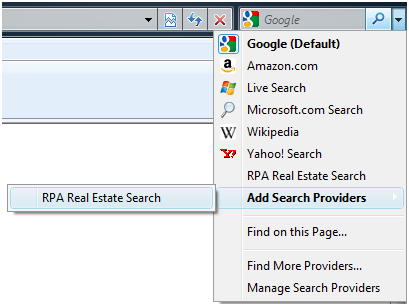 |
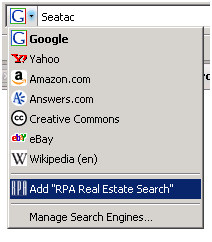
|
I’ve also added a button in RPA’s search bar (see above right) in case site visitors don’t discover our search provider via the browser (I suspect most users would miss it otherwise).
After you’ve registered RPA’s search provider with your web browser, you can select it and just start typing. Since I’ve implemented a suggestions service, it will auto complete cities, school districts & neighborhoods as you type them (Didn’t I say this was cool?). I should note that although IE 7 & Chrome support OpenSearch, only IE 8 and Firefox currently support the suggestions providers. Anyway, if you wanted to look for listings in Bellevue, here’s what it currently looks like.
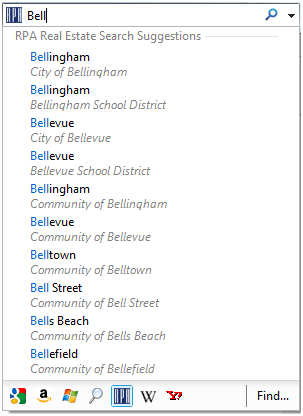 |
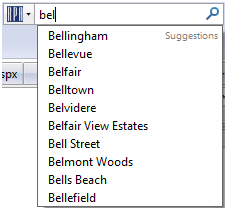 |
As you’ll notice, IE 8 & Firefox 3 displays suggestions differently on RPA’s site. This is intentional because IE 8 supports a newer version of the OpenSearch standards (Microsoft calls it Visual Search) and I designed RPA’s search provider to exploit this fact. In Firefox, the browser can only handle plain text suggestions, which can lead to ambiguous searches. For example, let’s say you search for Riverview. Riverview is both a neighborhood in Kent and a school district in Carnation / Duvall, so in Firefox there is no means for the user to tell the web site in which context they meant to search for when they typed in Riverview. I suppose one could create a “Did you mean” results page for cases like this, but I think that somewhat defeats the purpose of having suggestions support.
However, in IE 8, if a term has multiple contexts, the search provider can display them all and the user can select the one they meant. Also in IE 8, the search provider can display thumbnails next to the suggestions, which further helps the user quickly find what they are looking for. Although, I haven’t implemented that feature yet (mostly because I wasn’t sure what picture I should put up there for search terms that return multiple results), other web sites have. For example, if you wanted to buy a movie from Amazon or learn more about our 16th president from Wikipedia, the IE 8 search provider experience looks like this…
 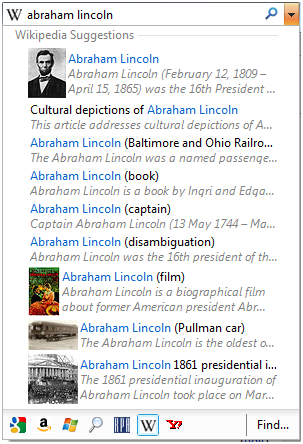 |
As the Redfin developers stated, implementing OpenSearch Referrer extensions are surprisingly easy (so I think users will soon request them from all web sites once the word gets out). The OpenSearch Suggestions extensions are more difficult to implement because every single keystroke is essentially a REST web service call. If you aren’t careful, you could bring your web server to its knees real quick. However, given all the AJAX map based tricks today’s real estate web sites perform, this isn’t anything that a professional software engineer can’t handle.
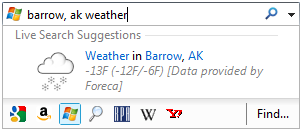 Call me crazy, but I think OpenSearch providers are going to become bigger than RSS feeds over the next year. If IE 8’s forth coming release doesn’t launch them into the mainstream, I think future releases of Firefox & Chrome will improve upon IE 8’s good ideas. Maybe you should think of it as browser favorites on steroids? If search is sticky, then OpenSearch is superglue and duct tape. If Firefox’s suggestions support were the tip of the iceberg, then IE 8’s implementation is cooler than Barrow, Alaska. The future of OpenSearch looks bright, even if it’s cold outside.
Call me crazy, but I think OpenSearch providers are going to become bigger than RSS feeds over the next year. If IE 8’s forth coming release doesn’t launch them into the mainstream, I think future releases of Firefox & Chrome will improve upon IE 8’s good ideas. Maybe you should think of it as browser favorites on steroids? If search is sticky, then OpenSearch is superglue and duct tape. If Firefox’s suggestions support were the tip of the iceberg, then IE 8’s implementation is cooler than Barrow, Alaska. The future of OpenSearch looks bright, even if it’s cold outside.
Redfin Circles Back to an Old Biz Model…
Redfin‘s been through so many business models over the years, I can completely understand why some folks would think that Redfin is entering a new area by working with real estate agents, but I can’t help remind folks that this is a business model that they’ve tried in the past… and it failed miserably the first time.
In only the 2nd time Redfin was mentioned on RCG, Anna was upset (to put it mildly), that Redfin had gone from being a company that did only referral business to agents (accepting a 20% cut), to including a flat-fee option for FSBO’s to get their listings in the MLS. (Jun ’05)
A few months later, RCG agreed to give Redfin a 2nd chance after they had dropped all references to the flat-fee option for sellers from their website. (Oct ’05)
However, the Redfin evolution when Glenn Kelman took the helm of Redfin in Sept ’05. From this article Galen published in Jan ’06, Glenn Kelman is being quoted talking about Redfin’s referral busines to agents saying:
“How do we make money now? People sign up for a real estate agent… The real estate agent and Redfin share the fruits of that.”

I SOOO wish I had a screenshot of Anna’s profile she had on the Redfin site back in early ’05 because the content on the page would be shockingly similar to the current agent profiles. I can’t remember exactly what the profiles looked like, but I’m almost positive they listed the agent’s recent transactions and had consumer reviews (I vaguely even remember a star system for the agents).
I honestly wish no ill will on the Redfin folks and wish them the best in their latest endeavor. It’s just that the blogger in me can’t believe so many folks are letting them get away with saying they are doing something new. About the only thing I see new with this program is that they are charging a 30% referral fee instead of the 20% they used to charge to agents back when Anna took part in ’05.
John Cook Interviews Redfin CEO: Redfin is "crazy-good"
Dustin pointed out that John Cook over at the Seattle PI just published an interesting interview of Redfin’s CEO, Glenn Kelman (Direct link to the mp3).
Before I jump in, I should point out that I run ShackPrices.com, a site that is faintly a Redfin competitor. That said, that both Redfin and ShackPrices are much more worried about our customers and competitors with lots of money than we are about each other. I’ll try my best to stay unbiased.
Up to this point, Dustin has been under the impression that Redfin is very insular (He’s even gone so far as to say “arrogant”). I get the impression that Redfin has some interesting technologies, but they are still looking for their path; Glenn is doing a big marketing push on a site that has only had cosmetic changes (to real estate buyers) in the last year. Throughout the interview he raves about his site. I think he says exciting ten times and “crazy-happy” or “crazy-love” at least three times. If you check Redfin.com, their news bar clearly shows that they’re on a marketing push (it also shows they still don’t have an interface person who can tell them to use that valuable space more effectively).
Glenn then talks about how addictive (crazy-addictive?) he finds the Redfin site. Personally, I get much more excited by the technologies behind PropSmart and Trulia. Those sites seem to have added to cool aerial photos with some real focus on the user interface. Redfin gives you great information about individual houses and even shows you the lot line, but it doesn’t give you any medium- to big-picture information. Neighborhood and city pricing information is worth much more than a single house’s historical sales (and this is coming from the dude who has only historical sales on his site).
I think it is interesting how an interview can really bring out the best and worst in somebody by just letting them talk. More articulately than anyone else I’ve heard from Redfin, Glenn describes the company’s lack of focus. For instance, he talks about how every state is different and national websites can’t accommodate that. Next, he talks about how he’s going to expand down the West Coast and all over the country. He talks about how cool the site is and how technology is changing, but gives digital photos of houses as an example of this trend (that was cool 5 years ago!). Even in vegan-city Seattle, I want to know where’s the meat to go with this fluff? When asked what’s driving traffic to Redfin, Glenn says “because it’s an awesome site.” I think I would have gone with “aerial imagery, property outlines and past sales data.” And if they don’t add to that list, they risk becoming just-another-mapping-site.
A while back, Anna wrote this article that showed how Redfin wants it both ways with real estate agents… and it is interesting that while Glenn is new to the staff (he started in September), he inarticulately describes this same conundrum that Redfin faces.
He says,
we’re not trying to serve the real estate agents… sell people out to real estate agents… what we’re trying to do instead is serve the consumer directly…
But when pressed by John about how Redfin makes money, he says
How do we make money now? People sign up for a real estate agent… The real estate agent and Redfin share the fruits of that.
Which essentially means “by selling customer names to agents.” I’ll give him credit – I hate the housevalues model and find it to be really sleazy and maybe there really is something to be said for waiting until someone requests an agent. However, they are not, as he says, “trying to do something totally different.” Redfin is just leaving more money on the table and, possibly generating higher-quality leads. I’m going to read into this, though, and say that they don’t plan on working with agents for long – note his question to himself “How do we make money now?”
Dustin says “it is not hard to read between the lines that he’d really like to squeeze those agents out of the business if only it wasn’t for those “great” relationships he’s built up with a few of them.” I agree. Late in the interview he emphasizes how he wants to balance the business model:
… balancing our business model. We’ve got real estate agents that are partners, that we still value enormously, but we want to make sure we keep the focus on the home buyer and seller who is the customer.”
Word to agents: now that we have funding, you are not a priority.
This is my favorite part:
If you walked into Redfin, all you would see are engineers and a customer support person.
-Galen
ShackPrices.com
Redfin — The Anti-Google
[photopress:sasha_with_troll.JPG,thumb,alignright]I’m extremely disappointed in the latest direction that Redfin has taken and I’d like to use this post to explain why I’ve completely stopped doing business with them.
For those of you not familiar, Redfin is a company that has developed a really great aerial technology for viewing MLS data. When they came out, I signed up as a “Redfin Agent” because their technology was superior to anything else available for searching the MLS. In previous blog entries I’ve mentioned how great their technology is.
How did they plan to make money? In the simplest sense, their business plan involved displaying MLS information via an intuitive interface using aerial images. When prospective clients would look for a home, Redfin would direct them to local real estate agents. After the prospective clients purchased a home, the real estate agent would send a portion of the closing commissions (20%) back to Redfin. By repacking the MLS data in a new way and getting real estate agents to promote them, they hoped to take the industry by storm. However, their site must not be nearly as popular as they hoped because their newest business venture turns them into a discount real estate company.
However, I wouldn’t write this blog entry if they were just another discount real estate agency. I don’t have a problem with discount real estate agencies and I think they provide a useful service for a subset of sellers (and besides, they keep us full-service agents on our toes!). The reason I write this article is that Redfin went from being a partner with real estate agents to a competitor. I think they assumed they could use the goodwill that they’ve built up with agents to slip a fast one on us.
The worst part is that Redfin didn’t have to go that route. Early on, I talked with them about licensing their technology to display MLS over my site. When the showed only passing interest, I decided to develop the MLS Search Engine myself… And while my technology is still in the infant stage, I’ve found a way to display MLS data over aerial photos (so don’t believe their front-page marketing that says that are the only ones doing this!).
If you are currently a “redfin agent” (like I was!), please join me in severing your business relationship with Redfin until they decide to join us again as a partner. As Redfin doesn’t offer a way to “delete” your account, I recommend doing the next best thing. To delist yourself from their database, go to: http://www.redfin.com/stingray/do/my-redfin. Log in using your username and password. Click “edit your profile

